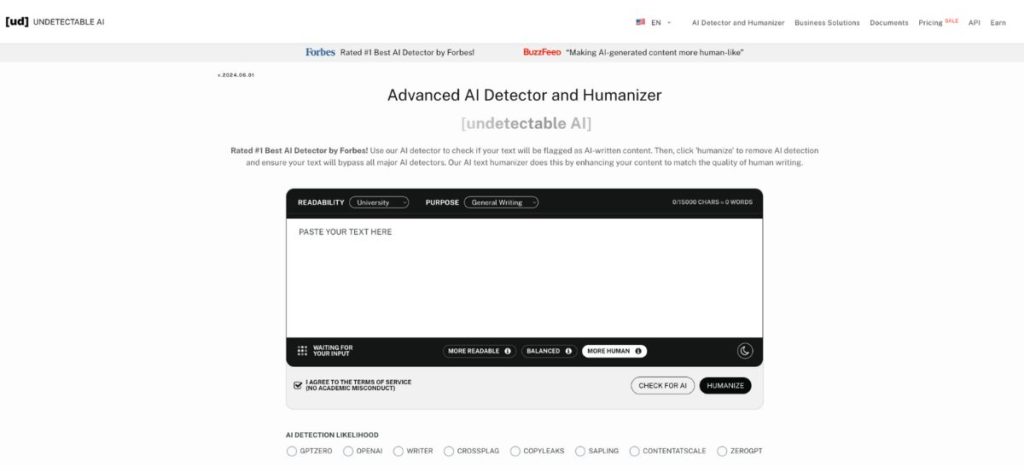Have a big job interview coming up, and it’s giving you anxiety? That’s completely understandable.
Nearly seven out of ten people said that their current job search was way harder than their last one.
We all know how important it is to make a great first impression. But as you try to prepare, you’re not sure where to start.
What questions are they going to ask? How should you respond to stand out?
Preparing for interviews can easily feel overwhelming. And to perform well, you’ll need to be both confident and ready to tackle anything that comes your way.
Luckily, AI can help you do just that.
These days, AI tools are part of everyday life. They streamline everything from grocery shopping to complex work tasks.
And when it comes to interviews, ChatGPT can help you practice and polish your interview responses.
Here’s our guide on how to use ChatGPT to prepare for an interview. It’s time you get ahead of the competition by making AI your secret interview prep partner.
Benefits of Using ChatGPT for Interview Preparation
ChatGPT has quickly become a favorite AI tool – over 200 million people use it weekly. Job seekers benefit from it, too.
ChatGPT interview prep offers plenty of ways for you to get ready for interviews (more on that later).
But first, let’s break down why using ChatGPT for interview prep is beneficial:


Never Worry About AI Detecting Your Texts Again. Undetectable AI Can Help You:
- Make your AI assisted writing appear human-like.
- Bypass all major AI detection tools with just one click.
- Use AI safely and confidently in school and work.
Personalized Practice Questions
ChatGPT can create questions that fit your specific role, industry, or experience level.
So, if you’re being interviewed for a marketing job, you can ask ChatGPT to generate marketing-related questions.
This AI chatbot might even quiz you on campaign strategies, digital trends, or data analytics.
This customized way of practicing helps you go beyond the generic interview prep and respond with more confidence and relevance.
Detailed Feedback and Suggestions
After you answer a sample question, ChatGPT can then offer you some constructive feedback. It can show you where to be more concise.
The tool can also suggest how you can clarify your examples or recommend ways to emphasize your strengths.
This targeted feedback can greatly improve your answers.
As you practice, you’ll feel more at ease and polished for the actual interview.
Simulating the Interview Atmosphere
ChatGPT can act like a real interviewer, giving you a conversational, back-and-forth practice session.
This realistic setup can reduce your anxiety and make the real interview feel more familiar.
You can also ask the AI tool for some follow-up questions or request it new prompts to keep challenging yourself.
Building Your Soft Skills

Source: The Importance of Soft Skills in Hard Times – Enterra Solutions
Beyond answering questions, ChatGPT can help you refine “soft” skills, just like how you can open up to salary questions or articulate your career goals in a professional way.
Remember that companies aren’t only looking for technical expertise.
Soft skills are your interpersonal and communication abilities, like teamwork, adaptability, and empathy. People with excellent soft skills make a great impression on hiring managers.
Best Practices for Interview Preparation with ChatGPT

ChatGPT is an effective tool for interview prep, but the key is how you use it. Knowing how to use ChatGPT to prepare for an interview seriously depends on the AI prompts you give the tool.
The more specific you are, and the more you know about the workaround, the better the results.
Here are some tips to help you make the most of your ChatGPT interview questions.
Provide Role-Specific Information
Start by telling ChatGPT about the role you’re interviewing for. Share the details of the job title you’re applying for and what industry you’re in. You can also include the specific skills needed.
If you’re applying for a social media specialist job, for instance, ChatGPT can create questions that suit that role.
Adding specific tools, projects, or responsibilities can make the questions even more tailored to your interview, so you’ll be better prepared.
Clarify the Interview Style: Behavioral, Technical, or Case-Based
Before diving into the interview prep questions and answers, let ChatGPT know the type of interview you’re preparing for.
Each interview style requires a different approach, so specify the format for the best prep experience.
- Behavioral Interviews: These focus on your past work experiences and problem-solving skills. Let ChatGPT know if you need to practice for a behavioral interview. It will then provide prompts that ask you to share specific examples of past challenges or successes.
- Technical Interviews: For technical or problem-solving interviews, ChatGPT can generate questions that test your skills. Specify coding languages, tools, or concepts for the best results. This way, you can practice the kinds of technical questions you’re most likely to get.
- Case-Based Interviews: If you’re facing a case-based interview, which is often seen in consulting or analytical roles, ChatGPT can simulate real-world scenarios for you. Ask for business cases or strategic questions to help practice your analytical thinking.
With these best practices, you can get the most out of your ChatGPT interview prep and walk into your interview ready to shine.
6 Steps to Use AI for Preparing for Your Interview

AI is a valuable tool for job seekers, letting you hone interview skills and prepare effectively. Knowing how to ask AI questions, especially with tools like ChatGPT, is key to getting the most out of it.
You can follow these steps to learn how to use ChatGPT to prepare for an interview. It’s time you nail your upcoming interview!
1. Identify Key Skills and Qualifications for the Role
First, know the most relevant skills and qualifications for the position you’re applying for. AI can identify these for you by analyzing job descriptions or simulating a hiring manager’s perspective.
You can use prompts to ask ChatGPT about specific skills that might matter in a role.
Example Prompt: “What are the essential skills for a software engineer in a fast-growing tech company?“
With ChatGPT, you can go even deeper. Ask it to list the top technical skills and what soft skills you need.
Even if you already have an idea of what these are, asking the AI tool gives you more focused answers that highlight your strengths and match the job’s needs.
2. Generate Common and Role-Specific Interview Questions
Once you know the key skills for the role, you can now generate relevant ChatGPT interview questions. AI can create both general and role-specific questions that align with the position.
It’s an effective way to anticipate what hiring managers might ask.
Example Prompt: “What are some common questions for an entry-level data analyst role?“
You can also tailor questions to the role’s industry or requirements, like specifying more technical questions. This way, you can practice a range of questions and develop well-rounded answers.
3. Use ChatGPT for Mock Interviews
With ChatGPT, you can also simulate a real interview setting. AI can act as the interviewer, asking questions and waiting for your answers.
This back-and-forth practice helps you become more comfortable in answering questions naturally.
Example Prompt: “Simulate an interview for a sales position where you ask behavioral questions about overcoming challenges.“
ChatGPT can even adjust to different interview styles, like behavioral or technical, so you can get a feel for varying question types.
This mock interview practice lets you adapt to the format, refine your answers, and feel more prepared for the real thing.
4. Ask ChatGPT for Feedback on Your Answers
Now that you’ve practiced your answers, you can ask ChatGPT for feedback to improve your responses. The AI tool can provide constructive suggestions so you can polish your responses and make them more engaging.
Example Prompt: “I’m preparing for a behavioral interview for an operations manager position and have crafted an answer to the question: ‘Tell me about a time when you got stuck on a project. How did you handle it, and what was the final outcome?’
Here’s my answer:
‘In my previous role, I was managing a large logistics project when we suddenly lost a key supplier due to unforeseen circumstances. This setback threatened our timeline and budget. I quickly gathered the team to brainstorm alternative suppliers and reached out to industry contacts to find a replacement. We prioritized maintaining quality and keeping costs reasonable. Within a week, we secured a new supplier, adjusted our schedule, and resumed production. The project was completed only a week behind schedule, and the client was impressed with our adaptability and commitment to quality.’
Could you review my answer and provide feedback to improve it?”
ChatGPT can analyze the tone, clarity, and effectiveness of your answers. You’ll gain valuable insights so you can communicate more effectively and feel prepared for tricky questions.
5. Customize ChatGPT’s Tone for Different Interview Settings
Different job roles and company cultures require different communication styles. With ChatGPT, you can adjust the tone of your practice interviews to match the specific setting.
If you’re applying to a tech startup, for example, you might want a more casual tone. For a corporate position, a formal tone is often best.
Customizing the tone aligns your responses with the organization’s vibe, which makes a strong impression.
This flexibility lets you practice for both formal and relaxed tones, ensuring you’re ready for whatever the interview setting requires.
6. Make ChatGPT Responses Sound More Human

While using ChatGPT for interview prep is certainly beneficial, remember that it’s still essential to sound genuine. ChatGPT’s not a foolproof tool, so don’t rely on it word-for-word.
Think of it as a foundation you can build on, refining each answer to sound more personal.
There are even tools designed to help with this. The Undetectable AI Humanizer, for example, is a trusted tool that can “humanize” AI-generated content to make it sound more natural and original.
An AI humanizer is particularly useful to ensure that your AI-written responses don’t sound too robotic or lack personality. Try it out—just click on the AI Humanizer widget below!
Undetectable works by adjusting the tone and language to match real human speech patterns, allowing you to maintain your unique voice.
This, in turn, gives you confidence that your answers will come across as authentic in your interview.
Conclusion
Knowing how to use ChatGPT to prepare for an interview can give you a real edge over the competition. ChatGPT makes it easier to anticipate questions, refine your answers, and practice with confidence.
AI is a powerful tool, and when used well, it can help you feel fully prepared and ready to impress. But keep in mind that authenticity matters, too.
For the finishing touch on your ChatGPT interview prep, consider using Undetectable AI as your partner.
With Undetectable, you can be sure that your responses sound natural and true to you. Ace that interview thanks to AI, and let Undetectable keep you polished and ready to stand out!
